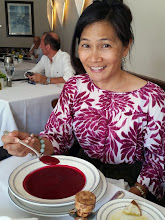Reflecting on the horrific events of last Monday in Boston, I tried to remember what the most impactful events were in the United States when I was a child.
The 1960s were full of hope. A historic sit-in for civil rights took place at a Woolworth's in Greensboro, as four African American college students used nonviolence to protest segregation. The Beatles visited the United States, twisting and shouting to the screams to hysterical teens. The Peace Corps were established by Sargent Shriver, sending our youth to developing nations to share our knowledge in exchange for a lesson in the planet's shared humanity. The first functioning laser was invented at Hughes Research Laboratories in Malibu. Thurgood Marshall became the first African American U.S. Supreme Court, and Neil Armstrong became the first American on the moon.
A lot of bad things happened too. I was born in 1965, the year of the first riots in Los Angeles. The Vietnam War raged on, spanning three decades of violence, dissent, and for many Americans, an umprecedented loss of faith in our government that I don't think we've fully recovered from since. The world said goodbye to Norma Jean, aka Marilyn Monroe, Malcolm X, Medgar Evers, both John and Robert Kennedy, and Che Guevara.
We fared only slightly better in the 1970s at least here, on the home front - largely due to the distraction of disco. I remember the news being full of Watergate, the kidnapping of Patty Hearst by the Symbionese Liberation Army, and the energy crisis. For years, we were admonished to turn the lights off when they weren't being used. For years, nobody hung Christmas lights because of the excess of electricity they used.
 |
| Union Square, 2013 |
But what good is it if so many people are bent on killing their fellow human beings - and not on a foreign battlefield, as was the controversy with wars overseas, but right here in what is considered a first world, technologically advanced and intellectually enlightened nation?
In the wake of the Sandy Hook massacre last December, I barely noticed the displays of American flags returning to their usual flying height before they were lowered to half mast again this week. Actually as of late, it seems that half mast is now the default position for a flag that once flew proudly on the moon's surface.
We survived a lengthy war in Afghanistan and Iraq, the remnants of which we still deal with, in our soldiers who came home with scars of varying degrees, and the civilizations that the wars have left their mark upon, for better and for worse. We have technology now that goes above and beyond any science fiction that ignited the imagination of my generation. (I'm still waiting for the flying cars that they had on "The Jetsons," but am less hopeful now that we have all but lost our federal space program.)
I don't have any great answers, nor helpful solutions. But I do think that a fix to the despair and sorrow - conditions that occur before such a tragedy that in effect, create it - needs to start at home.
Not just with one's family, but with the whole human family that each block, each town or city, and each state contains. When something like the Boston Marathon tragedy occurs, we worry about what to tell the children. What we should think about even more is what to tell children before they grow up to do something as terrible as what the two brothers enacted upon an innocent gathering of happy, health conscious participants and their cheering onlookers.
This reposting of a blog post by Jonah James Fontela really captures it for me. While on a bike ride near the Charles River, he watched the burgeoning spring reveal itself in the calm of a city after a nightmare of unimaginable proportions. Along with the beauty of nature, he also saw a microcosm of the human drama, both in his own personal history and in the lives of his fellow Bostonians.
"Breakfast and tooth brushing and work and everything else could wait," write Fontela. "I looped around the river, along its edges on both sides. I saw trees with purple flowers beginning their bloom above empty benches on the water’s edge. Cops barked and car horns honked in this city where I’ve spent the last 13 years of my life. I saw buildings I worked in when I was still a scared kid and didn’t know shit, bars where I drank, places where I made mistakes. I saw the sun and rippling water, a pregnant woman jogging, rowers rowing silently under the Mass Ave Bridge. I said hello to everyone I passed, the walkers, the runners, the mothers, the fathers, the homeless, the old couples holding hands, the tourists – a seagull. This morning I saw things I’ve never seen before."
We need to show the children - and probably more often than not, ourselves - the beauty, promise, and strength that lies in them and in each one of us. We need to especially do our best with those individuals who are harder to reach, because you never know what kind of pain they are in, or what they might do with it.
One Christmas season in the late 1980s, after becoming accustomed to another year without Christmas lights, they began to appear once more on the houses in my neighborhood. Timid strands would outline the roofs at first. Then over several years, windows, trees, shrubs, and every surface that would support a string of lights began once more to sparkle in the night.
Hopefully, one day, seeing our flag at half mast will become a rarer occurrence than it is today.






Thanks to Yummybook's Blog and A Year of Soup for inspiring this post!... It's great to have a tribe of bloggers-kindred spirits out there!
ReplyDelete